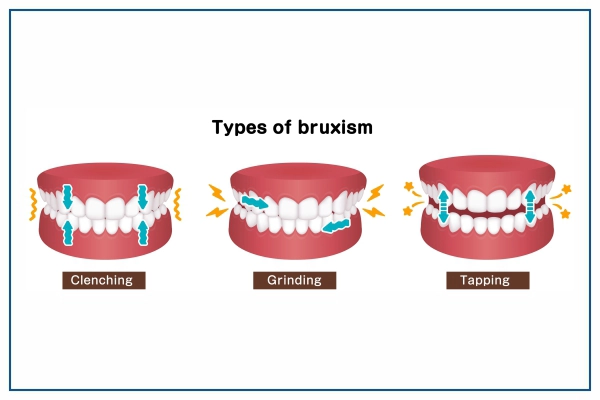Bruxism (Teeth Grinding ): Symptoms, Causes - Get Treatment
Bruxism or teeth grinding is the unconscious excessive grinding, clenching or gnashing of the teeth. It is a common behaviour that can lead to dental problems. Some people grind their teeth during sleep (sleep bruxism), while others do it when they are awake (awake bruxism). Generally, people don't realise that they are clenching their teeth during sleep. People sleeping beside them are mostly the first ones to find out about this habit as they can hear their teeth grinding sound at night. Bruxism in sleep (sleep bruxism) is a sleep disorder. People with this disorder are more vulnerable to have other sleeping problems, like snoring and pauses in breathing (sleep apnea). Mild bruxism does not need any treatment. But in some people clenching can be persistent and severe to cause jaw disorders, damaged teeth, headaches and other health problems.
Teeth grinding symptoms
Bruxism or teeth grinding symptoms can vary from person to person. Some common symptoms include:
- Grinding or clenching teeth, which can make a loud noise to wake up someone sleeping beside.
- Irregular shaped teeth that are fractured, flattened, chipped or loose.
- Tense facial and jaw muscles
- Tongue indentations
- Facial pain
- Damage to the inside of the cheek
- Increased tooth pain or sensitivity
-
Sleep disorders
-
Headaches
- Dislocation of the jaw
- Locking of the jaw
Risk factors of Teeth symptoms
The bruxism risk factors include:
-
Stress: Increased stress, anxiety, anger or frustration can result in teeth grinding.
-
Age: Teeth clenching habit is usually observed in young children, and it disappears by adulthood.
-
Personality: A person with a competitive, aggressive or hyperactive personality can be at an increased risk of bruxism.
-
Medications: Some psychiatric drugs may have a rare side effect that causes people to clench their teeth. The risk of bruxism may also rise by using recreational drugs, smoking tobacco and drinking caffeinated beverages or alcohol.
-
Family history: Sleep bruxism is observed in families. People are more likely to suffer from teeth grinding if their parents or siblings also had the same habit of bruxism.
-
Other health disorders: Bruxism can be associated with certain mental health problems such as parkinson's disease, epilepsy, dementia, night terrors, gastroesophageal reflux disorder (GERD) and sleep disorders including sleep apnea, and attention-deficit/hyperactivity disorder (ADHD).
Diagnosis of Teeth grinding
The dentist will conduct a regular dental examination to check for signs of teeth grinding and if required will perform a dental X-ray examination.
If there are any signs of bruxism, the dental doctor will monitor changes in a patient's teeth and mouth over the next several visits to check if the grinding process is progressive. Accordingly, the dentist will advise a treatment plan.
Determining the cause
If the dentist confirms that the patient has bruxism, the doctor will inquire about the general dental health, medications, daily lifestyle habits and sleeping schedules.
- The dentist may fit a night guard (‘bite splint’) for teeth and may prescribe a muscle relaxant to take before bedtime to help relax the jaw muscles and stop night-time grinding.
- For some people suffering from severe grinding and who don't respond to other treatments methods, botox injections may give relief.
- The healthcare provider may prescribe antidepressants or anti-anxiety medications to reduce stress factors or other emotional issues causing bruxism.
- Treatment for risk factors such as epilepsy, parkinson’s disease, dementia, gastroesophageal reflux (GERD) and sleep disorders.
Management of bruxism can include:
- Stress management therapy
- Cognitive behaviour therapy
- Relaxation techniques
- Hypnotherapy
- Good sleep hygiene
- Regular exercise
- Repair tooth damage

